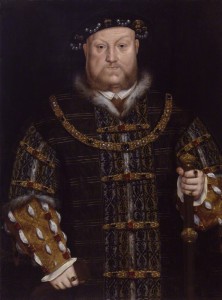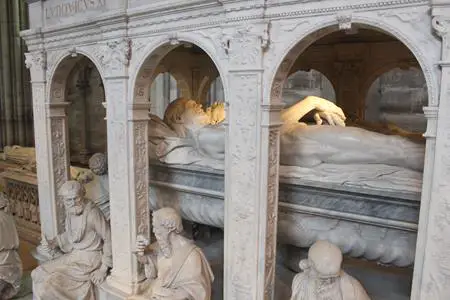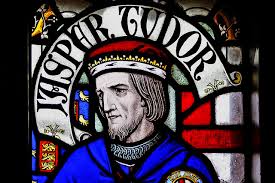 On 30th December 1546, Henry VIII signed his last will and testament, authorising changes he'd instructed William Paget to make on his behalf on 26th December 1546.
On 30th December 1546, Henry VIII signed his last will and testament, authorising changes he'd instructed William Paget to make on his behalf on 26th December 1546.
You can find a transcript of Henry VIII's will from Letters and Papers below, but I'd highly recommend Suzannah Lipscomb's book The King is Dead as it guides the reader through the last few months of Henry VIII's death and argues that Henry was in control right to the end and that his will reflected his wishes and not those of the Reformists surrounding him. It is a wonderful read and also contains a transcript of the will.
Remembering the great benefits given him by Almighty God, and trusting that every Christian who dies in steadfast faith and endeavours, if he have leisure, to do such good deeds and charitable works as Scripture commands, is ordained, by Christ's Passion, to eternal life, Henry VIII. makes such a Will as he trusts shall be acceptable to God, Christ, and the whole company of Heaven, and satisfactory to all godly brethren in Earth. Repenting his old life, and resolved never to return to the like, he humbly bequeaths his soul to God, who in the person of His son redeemed it and for our better remembrance thereof "left here with us in his Church Militant the consecration and administration of his precious Body and Blood"; and he desires the Blessed Virgin and holy company of Heaven to pray for and with him, while he lives and in the time of his passing hence, that he may after this "the sooner attain everlasting life." For himself he would be content that his body should be buried in any place accustomed for Christian folks, but, for the reputation of the dignity to which he has been called, he directs that it shall be laid in the choir of his college of Windesour, midway between the stalls and the high altar, in a tomb now almost finished in which he will also have the bones of his wife, Queen Jane. And there an altar shall be furnished for the saying of daily masses while the world shall endure. The tombs of Henry VI. and Edward IV. are to be embellished. Upon his death, his executors shall, as soon as possible, cause the service for dead folk to be celebrated at the nearest suitable place, convey his body to Windsor to be buried with ceremonies (described), and distribute 1,000 mks. In alms to the poor "(common beggars, as much as may be, avoided)" with injunctions to pray for his soul. St. George's College in Windsor Castle shall be endowed (if he shall not have already done it) with lands to the yearly value of 600l., and the dean and canons shall, by indenture, undertake:—(1) to find two priests to say mass at the aforesaid altar; (2) to keep yearly four solemn obits at which 10l. shall be distributed in alms; (3) to give thirteen poor men, to be called Poor Knights, each 12d. a day, and yearly a long gown of white cloth &c. (described), one of the thirteen being their governor and having, in addition, 3l. 6s. 8d. yearly; and (4) to cause a sermon to be made every Sunday at Windsor.
As to the succession of the Crown, it shall go to Prince Edward and the heirs of his body. In default, to Henry's children by his present wife, Queen Catharine, or any future wife. In default, to his daughter Mary and the heirs of her body, upon condition that she shall not marry without the written and sealed consent of a majority of the surviving members of the Privy Council appointed by him to his son Prince Edward. In default, to his daughter Elizabeth upon like condition. In default, to the heirs of the body of Lady Frances, eldest daughter of his late sister the French Queen. In default, to those of Lady Elyanore, second daughter of the said French Queen. And in default, to his right heirs. Either Mary or Elizabeth, failing to observe the conditions aforesaid, shall forfeit all right to the succession.
Appoints as executors of this will the Abp. of Canterbury, the Lord Wriothesley, Chancellor of England, the Lord St. John, Great Master of our House, the Earl of Hertford, Great Chamberlain of England, the Lord Russell, Lord Privy Seal, the Viscount Lisle, High Admiral of England, the bishop Tunstall of Duresme, Sir Anthony Broun, Master of our Horse. Sir Edward Montagu, chief judge of the "Commyn Place," Justice Bromley. Sir Edward North, Chancellor of the Augmentations, Sir William Paget, our chief Secretary, Sir Anthony Denny and Sir William Harbard, chief gentlemen of our Privy Chamber, Sir Edward Wootton and Dr. Wootton his brother. All these shall also be Councillors of the Privy Council with Prince Edward; and none of them shall do anything appointed by this Will alone, but only with the written consent of the majority. Sir Edmond Peckham, cofferer of our House, shall be treasurer of all moneys defrayed in performance of this Will. Debts, with redress of injuries (if any such can be proved, although he knows of none) shall be their first care after his burial. All grants and recompenses which he has made or promised but not perfected are to be performed.
To his son Edward he gives the succession of his realms of England and Ireland, the title of France and all his dominions, and also all his plate, household stuff, artillery, ordnance, ships, money and jewels, saving such portions as shall satisfy this Will; charging his said son to be ruled as regards marriage and all affairs by the aforesaid Councillors (names repeated) until he has completed his eighteenth year. And the following persons shall be of Council for the assistance of the foresaid Councillors when required, viz., the present earls of Arundel and Essex, Sir Thomas Cheney, treasurer of our Household, Sir John Gage, comptroller of our Household, Sir Anthony Wingfield, our vice-chamberlain, Sir William Petre, one of our two principal secretaries, Sir Richard Riche, Sir John Baker, Sir Ralph Sadleyr, Sir Thomas Seymour, Sir Richard Southwell, and Sir Edmond Peckham.
Bequeaths to his daughters', Mary and Elizabeth's, marriages to any outward potentate, 10,000l. each, in money, plate, etc., or more at his said executors' discretion; and, meanwhile, from the hour of his death, each shall have 3,000l. to live upon, at the ordering of ministers to be appointed by the foresaid Councillors.
The Queen his wife shall have 3,000l. in plate, jewels and stuff, besides what she shall please to take of what she has already, and further receive in money l,000l. besides the enjoyment of her jointure.
For their kindness and good service his executors shall receive as follows, viz.:—the Abp. of Canterbury 500 mks., Wriothesley, St. John, Russell, Hertford and Lisle, each 500l., Durham, Broun, Paget, Denny, Herberd, Montague, Bromley, North, Sir Edw. Wootton and Dr. Wootton, each 300l.
In token of special love and favour, these Councillors and servants shall receive as follows, viz.:—The earl of Essex, Sir Thomas Cheney, the Lord Herberd, Sir John Gage, Sir Thomas Seymour, John Gates and Sir Thomas Darcy, each 200l., Sir Thomas Speke, Sir Philip Hobby, Sir Thomas Paston and Sir Maurice Barkeley, each 200 mks., Sir Ralph Sadleyr 200l., Sir Thomas Carden 200l., Sir Peter Meutes, Edward Bellingham, Thomas Audeley and Edmond Harman, each 200 marks, John Pen 100 marks, Henry Nevel, Symbarbe, ——Cooke, John Osburn and David Vincent, each 100l., James Rufforth, keeper of our house here, —— Cecil, yeoman of our Robes, —— Sternhold, groom of our Robes, each 100 mks., John Rouland, page of our Robes, 50l., the earl of Arundell, Lord Chamberlain, Sir Anthony Wingfeld, Sir Edm. Peckham, Sir Richard Riche, Sir John Bak[er] and Sir Richard Southwell, each 200l., Dr. Owen, Dr. Wendy and Dr. Cromer, each 100l., —— Alsopp, Patrick ——,——A[yliff],—— Ferrys, Henry——, and —— Hollande. each 100 mks., and the four gentlemen ushers of our Chamber, being daily waiters, 200l.
His executors may appoint legacies to other of his ordinary servants not here named.
Westminster Palace, 30 Dec. 1546, 38 Hen. VIII. Signed with the King's stamp at beginning and end.
Signed by witnesses, viz.: John Gates: E. Harman: Wyllyam Sayntbarbe: Henry Nevell: Rychard Coke: David Vincent: Patrec: [Ge]orge Owen: [Tho]mas Wendye: Robert Huycke: W. Clerk.
If you are interested in Henry VIII's will, Paget's amendments and what happened when Edward VI came to the throne in January 1547 you may also want to read these articles by Eric Ives, Helen Miller and Ralph Houlbrooke:-
- Henry VIII's Will: The Protectorate Provisions of 1546-47, Eric Ives, The Historical Journal, 37, 4 (1994) available to download at Cambridge Journals
- Henry VIII's Unwritten Will, Helen Miller, in "Wealth and Power in Tudor England", ed. E.W. Ives et al (London 1978)
- Henry VIII's Wills: A Comment", R. Houlbrooke, The Historical Journal, 37/4 (1994), available to download at Cambridge Journals
Source
'Henry VIII: December 1546, 26-31', in Letters and Papers, Foreign and Domestic, Henry VIII, Volume 21 Part 2, September 1546-January 1547, ed. James Gairdner and R H Brodie (London, 1910), pp. 313-348 http://www.british-history.ac.uk/letters-papers-hen8/vol21/no2/pp313-348 - scroll down to 634.



Leave a Reply